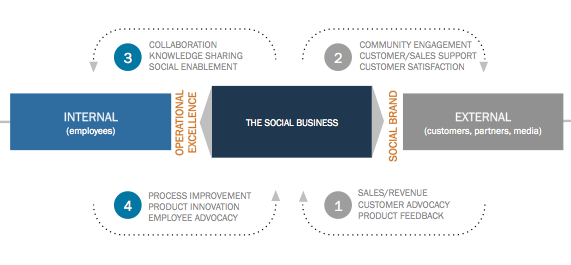I don’t like to argue definitions. It’s a waste of time. The discussion around organizational challenges and potential solutions to complex business problems matters. My clients never come to me and say, “Hey Brito, how do you define social business?” And it’ll never happen that way either.
Some organizational challenges I experienced firsthand when I worked for the enterprise were when employees were misusing social media or the lack of collaboration within the organization resulting in disjointed communities, content, and community management practices. These are some of the challenges of enterprise social media.
So as much as I dislike definitions, this is the appropriate place to insert one.
What is social business?
Social business is the blueprint for the transformation of an organization—bridging the external with the internal, resulting in a more connected way of doing business and shared value for all stakeholders.
The keyword here – is a shared value for all stakeholders.

As much as a social business model can help solve many business challenges, it must also provide shared value for the entire organization. The following social business model was created to illustrate this point:
(1) Certainly, the business value is when customers and partners purchase your products or services. Increasing sales, revenue, and market share are suitable for businesses. There is also value when they indirectly sell your products through customer advocacy. And lastly, customers love to give feedback, even when it doesn’t always make business sense.
So, here we have a one-way value exchange (customer to brand). There is value if your company makes good products or services and customers buy from you.
(2) To complete the value exchange externally, brands must build engagement with their customers. Several studies and research reports support this, and it’s also an intuitive way of acting, just as it is with any relationship. As a result, brands provide meaningful content, solve specific customer issues, help customers make smarter purchase decisions, and even just say thank you.
The two-way value exchange is completed when an authentic conversation occurs between a brand and its customers. This is what’s referred to as a social brand. Most companies are social brands. They are using social media technology to build community and add value to the conversation. However, some brands certainly do it better than others.
However, a social business’s real benefit is that it can drive value internally. And if done right, it can enable better marketing, customer relationships, employee innovation, employee advocacy, and much more.
(3) A Social Business Center of Excellence will usually be responsible for driving the execution of internal social business initiatives. In this case, they will deliver value to employees and partners in the supply chain (and marketing/support teams) by building collaborative workflows and processes that will result in knowledge sharing; and social enablement, i.e., equipping teams with training, best practices, technology that will allow them to communicate better both internally and externally.
This completes one-half of the internal value chain, which is focused on employee and partner enablement.
(4) In return, the natural result of enablement and empowerment are the great ideas sparked by employee and partner collaboration. Whether improving or revamping a new process or product innovation (Amazon Prime was an employee idea), the value is delivered back to the organization. As a result, employees are more productive, morale is improved, and workplace happiness will reign.
Lastly, when employees are enabled to engage externally with customers, there is conversation value since “employees of a company” are seen as trusted and credible sources (via Edelman Trust Barometer).
A social business not only solves complex business problems. It can also deliver maximum business value to the entire stakeholder ecosystem.
